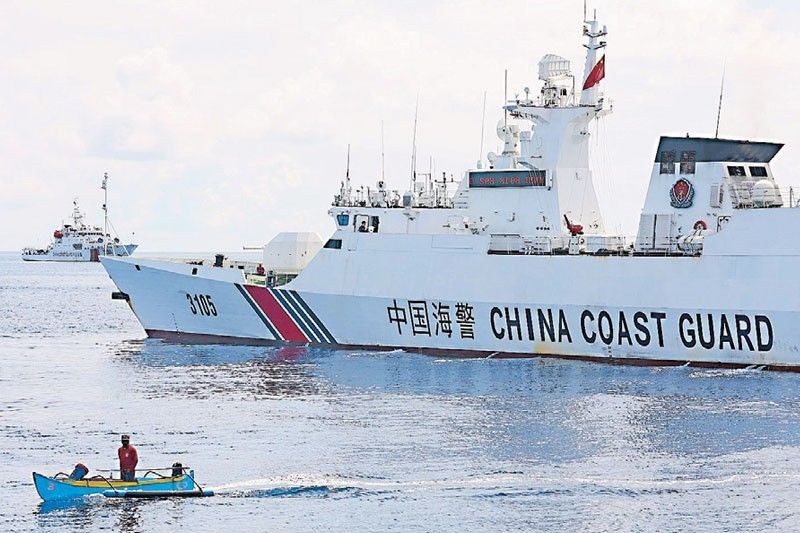Filipinos distrust China amid bullying at West Philippine Sea — survey

MANILA, Philippines — China's continued aggression over the disputed West Philippine Sea territories is causing growing discontent among Filipinos.
This sentiment is shown by a recent survey conducted by Oculum Research and Analytics.
China is the least trusted country among 1,200 respondents in the poll released on September 27, with 51% registering their disapproval.
The United States (US), Beijing's archnemesis on the global stage, notched the highest approval, at 62%.
China recently sparked a diplomatic row after it installed a 300-meter floating barrier along Scarborough Shoal to prevent the Philippine Coast Guard (PCG) and fishermen from entering the area, which Beijing claims to be theirs. Authorities slammed the blockage as a "clear violation of international law."
The PCG last week cut off a portion of the barrier under the orders of President Ferdinand Marcos Jr.
Commodore Jay Tarriela, spokesperson of the PCG for the West Philippine Sea, vowed to remove any future obstruction that may hinder fisherfolk from earning a living.
"In the coming months, if ever that barrier will once again be in place, the PCG will do whatever it takes for us to remove the barrier," Tarriela told reporters.
The Philippines is also accusing Chinese maritime militia vessels of massive coral harvesting that left patches of bleached and destructed corals along Rozul (Iroquios) Reef and Sabina (Escoda) Shoal, both part of Manila's exclusive economic zone (EEZ).
"We noticed coral harvesting in their swarming areas. When they left, we pinpointed it and sent divers to do an underwater survey; they saw that no corals were left – it was damaged, and there was debris," Vice Admiral Albert Carlos, head of the Western Command of the Armed Forces of the Philippines, said in a news forum on Septepmber 17. "[Whether] the damage is old or new, but from the eyes of the Navy divers, it looks recent."
China's billion-dollar disinformation campaign has been warned by the US State Department to challenge the "integrity of the global information space."
"When you look at the pieces of the puzzle and you put it together, you see a breathtaking ambition on the part of China to seek information dominance in key regions of the world," James Rubin, the State Department's Global Engagement Center special envoy and coordinator, told reporters on September 28.
"If we don't allow this information manipulation to be stopped, there's going to be a slow, steady destruction of democratic values. We don't want to see an Orwellian mix of fact and fiction in our world," he added.
National Security Council Assistant Secretary and spokesperson Jonathan Malaya previously divulged China's "psychological warfare" to weaken the Philippines's standing on the West Philippine Sea by deploying "political operators" engaged in propaganda. He added China is taking advantage of the political divisiveness engulfing Filipinos.
Headlines of China's provocation caused Filipinos to sour on the world's second superpower, Oculum chief political analyst Dennis Coronacion said.
"Several incidents of harassment committed against the Philippine Coast Guard and the Filipino fishermen by the Chinese Coast Guard in the disputed waters have always resulted in negative public perception toward China," Coronacion, a political science professor at the University of Santo Tomas, said in a release. "Past and present surveys indicate that the Filipinos have felt strongly about this geopolitical issue."
In the July 2022 poll conducted by Pulse Asia, 36% of Filipinos are wary of China compared to 33% who registered their trust. Russia and India also notched high disapprovals, at 36% and 32%, respectively.
Three years earlier, a Social Weather Stations survey classified China's approval rating as "bad," plunging to a -33 score amid warmer relations between the two countries at the time.
Pulitzer Prize-winning journalist Manny Mogato said that despite former president Rodrigo Duterte cozying up with Chinese President Xi Jinping, Beijing's persistent bullying already left an indelible mark on the Filipino consciousness.
"Even during the six-year term of former president Rodrigo Duterte, who was considered the most popular leader in power, he failed to influence Filipinos to raise trust ratings in China," he said in a release. "Duterte did not hide the fact that he was an avid fan of China's Xi Jinping and Russia's Vladimir Putin, and he had tried to bring the country closer to Beijing and Moscow and, at the same time, distance from its traditional security ally, the United States."
Mogato added that Filipinos' inclination to democracy, freedom and the rule of law made them more trustful to Western countries such as the United States and Canada.
China has refused to recognize the 2016 ruling of the Permanent Court of Arbitration adjudicating that the nine-dash line on Beijing maps violated Manila's 200-nautical mile EEZ.
Recently, the Chinese Foreign Ministry warned the Philippines not to make any provocations anymore.
The Oculum survey obtained responses from 1,200 Filipinos nationwide, randomly selected through a computer-assisted tool. It has a ± 3-percent margin of error at the national level.
Other people behind Oculum include chief statistician Joseph Mercado, former vice president for research, extension, planning and development at the Polytechnic University of the Philippines; project manager Romero Lopez, associate editor at PressONE; and oversight board members Msgr. Pedro Quitorio III, director of the Catholic Bishops Conference of the Philippines media office; and Felipe Salvosa II, editor at the Philippine Center for Investigative Journalism. — intern, Eduelle Jan Macababbad
- Latest
- Trending




























